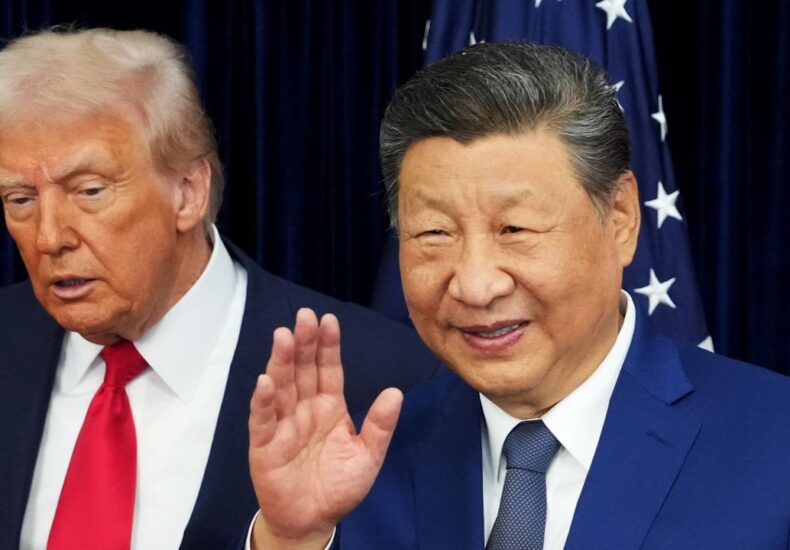
Trump’s trade war: has China won?
Donald Trump was in a “buoyant mood” as he flew back from his tour of Asia last week, reported Rob Crilly in The Telegraph. Air Force One was packed with gleaming gifts: a crown, a golf putter, and even a Nobel Peace Prize nomination. On board, the US president boasted about the billion-dollar investment deals he’d struck with Vietnam, Thailand, Cambodia, and Malaysia during a visit that included memorable moments — from breaking into a dance alongside rainbow-clad performers in Kuala Lumpur to grooving to “Y.M.C.A.” on a US aircraft carrier in Japan.
But Trump’s biggest prize, noted Mary Dejevsky in The Independent, was what he called an “amazing” meeting — a “12 out of 10” — with China’s President Xi Jinping. This took place on the sidelines of a summit in South Korea, where the two leaders declared a truce. There won’t be an all-out trade war between the world’s two biggest economies, “at least not yet.” For that alone, we can all “breathe a small sigh of relief.”
Trump was beaming when he announced the agreement, wrote Ian Williams in The Spectator. However, “on closer inspection, it is all rather underwhelming.” US tariffs on China, which at their peak had been as high as 154%, will be cut to an average rate of 45%. In return, China will resume buying soybeans from American farmers and pause its latest curbs on the export of rare-earth minerals for one year.
In other words, The Times observed, despite Trump’s tariff theatrics and bluster, US-China trade relations have essentially returned to where they stood when he reentered the White House.
The real-estate mogul likes to “crow” about his deal-making skills, said Nicholas Kristof. In reality, he has “bungled” what is arguably the most important bilateral trading relationship in the world today. Trump “badly miscalculated” when he rashly announced “liberation day” tariffs on China in April. His aim was to punish Beijing and reduce the US trade deficit, but he overlooked the fact that the Asian superpower now holds the upper hand in such negotiations.
China can buy US goods, including soybeans, from elsewhere. More crucially, it is the “OPEC of rare-earth minerals,” controlling around 90% of the world’s supply of these elements — which are essential for everything from cars and phones to military equipment. Xi was always going to weaponize this “near-monopoly” to force a reluctant US back to the negotiating table.
Now, the Chinese leader “sees” the US’s weakness and is likely to use it to induce “compliant behaviour” on major issues such as Taiwan. The US hasn’t just lost a trade war; it has also forfeited “a chunk of [its] global credibility and influence for years to come.”
https://theweek.com/politics/trumps-trade-war-has-china-won
You may also like
参考资料
You may be interested
Globe bets on prepaid fiber, sets expansion
No content was provided to convert. Please provide the text...
Bragging rights up as Samal makes 5150 debut
A stellar Open division field will be shooting for the...
DigiPlus launches P1-M surety bond program
MANILA, Philippines — DigiPlus Interactive Corp. has partnered with Philippine...
 The New York Times
The New York Times
- Air Canada Cancels Flights to Cuba as Cuba Runs Out of Jet Fuel 2026 年 2 月 10 日 Frances Robles
- The Epstein Files Are Coming for Keir Starmer 2026 年 2 月 10 日 Moya Lothian-McLean
- Bangladesh Exposed the Deeper Problem Facing Democracy 2026 年 2 月 10 日 Zahid Hussain and Tom Felix Joehnk
- Nicaragua Blocks a Route from Cuba to the U.S. 2026 年 2 月 10 日 James Wagner
- How Italy’s Police and Army Compete to Enlist Italian Olympians 2026 年 2 月 10 日 Jason Horowitz
- New Email Shows Bard President Leon Botstein Thanked Epstein for Caribbean Trip 2026 年 2 月 10 日 Vimal Patel
- Appeals Court Lets Trump Revoke Deportation Protections for 60,000 More Migrants 2026 年 2 月 10 日 Chris Cameron
- Judge Strikes Down California’s Ban on Masks for Federal Agents 2026 年 2 月 10 日 Laurel Rosenhall
- A Campaign to Revoke the Endangerment Finding Appears Near ‘Total Victory’ 2026 年 2 月 10 日 Lisa Friedman and Maxine Joselow
- Trump Threatens to Block Opening of Gordie Howe International Bridge to Canada 2026 年 2 月 10 日 Chris Cameron and Vjosa Isai



Leave a Reply